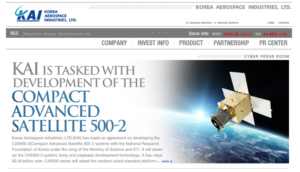This is a pretty big deal, posted tonight at the Washington Post:
A California man who says he served as a translator last year for Michael Cohen and a South Korean aerospace firm that paid Cohen’s company $150,000 said Tuesday that FBI agents recently interviewed him.
Mark Ko said in an email to The Washington Post that he spoke with the FBI about the arrangement “a few weeks ago.” Ko declined to provide details about investigators’ inquiries and said he was unsure whether the agents were part of the probe led by special counsel Robert S. Mueller III.
Ko’s statement is the first indication that federal authorities are examining Cohen’s contract with Korea Aerospace Industries (KAI) — one of several companies with substantial business before the U.S. government that hired Cohen, President Trump’s personal attorney and longtime legal fixer, after the 2016 election.
It also suggests the investigation into the payments has continued into recent weeks. Novartis and AT&T, which paid Cohen’s company $1.2 million and $600,000, respectively, have said they were contacted late last year by law enforcement officials working with Mueller, who is probing alleged Russian interference in the 2016 election.
Why is this important?
KAI, whose majority owner is the South Korean government, is partnered with U.S.-based defense contractor Lockheed Martin in vying for a major contract to provide the U.S. Air Force with trainer jets. The contract could be worth more than $16 billion.
 KAI, through Lockheed Martin, also has a strong connection to one of the most influential think-tanks in Washington on Korea policy: the Center for Strategic and International Studies (CSIS). Here’s what I reported in South Korea’s Newstapa in 2017, as described in my first take on the KAI/Cohen connection last week.
KAI, through Lockheed Martin, also has a strong connection to one of the most influential think-tanks in Washington on Korea policy: the Center for Strategic and International Studies (CSIS). Here’s what I reported in South Korea’s Newstapa in 2017, as described in my first take on the KAI/Cohen connection last week.
CSIS has played an important role in shaping US policy in South Korea for decades. But as the South Korean and US militaries have become more integrated in the face of North Korea’s nuclear and missile programs, CSIS has become an important forum where military collaboration – especially on the industrial side – is thrashed out and decided. Its role as a mediator was on vivid display in November 2016, when the center sponsored a conference on “U.S.-Korea Defense Acquisition Policy and the International Security Environment.”
The meeting drew high-level participation from the Park government, including Chang Myoung Jin, Park’s Minister for the Defense Acquisition Program Administration (who was removed from office in July for mismanaging a key export program) and Yi Yong Sic, the then-managing director of Korea Aerospace Industries (KAI). The meeting discussed difficult issues such as industry corruption and differences over US technology transfers. It marked an important step forward in the US-ROK military alliance, CSIS’s CEO John Hamre, a former Deputy Secretary of Defense, said in his opening remarks.
“For most of my professional life, Korea was a place what had to buy from others in order to protect itself,” he said. “We’re now seeing a big transition where Korea is now producing for itself and potentially producing things to sell to us. This is unprecedented…We’ve been military partners for 70 years but we are now going to be business partners in a very new way.”
Specifically, Hamre mentioned the export partnership between Lockheed Martin and KAI on the T-50 Golden Eagle trainer fighter. A year later, despite the shift in South Korea to [the progressive government of Moon Jae-in], these relationships have only deepened. The Lockheed-KAI T-50, for example, is now in contention with Boeing and Leonardo DRS for the US Air Force’s next trainer (the award will be made in 2018).
A full-fledged criminal investigation into KAI’s dealings with Cohen (and possibly Trump) could reveal a lot about how Korean and American military contractors operate in Washington – and the possible role that lobbyists and middlemen (such as CSIS) might play in marketing weapons to the Pentagon. For more on CSIS and how its fellow think-tanks do that, see my 2017 article, “US think tanks play major role in South Korea arms acquisitions,” in Newstapa.
